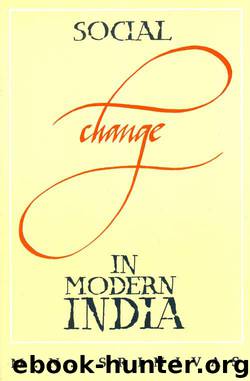Social Change in Modern India - Rev. Edn. by M. N.Srinivas

Author:M. N.Srinivas [N.Srinivas, M.]
Language: eng
Format: epub
Tags: Social Change in Modern India
Publisher: Orient Longman India
Published: 1999-12-31T18:30:00+00:00
3
SOME EXPRESSIONS
OF CASTE MOBILITY
1
THE FULL IMPLICATIONS of Westernization are indeed revolutionary for India, if what has already happened is any indication. That Westernization is indeed a fundamental process, and not something superficial and external, is made clear by the fact that it is the Indian elite who have taken upon themselves the great task of modernizing their society. Indeed, it is my contention that no alien body, however powerful and competent, could have introduced the changes which the indigenous elite have, in the brief period since India became independent.
The foundations for these changes were laid by the establishment of British rule over India, and the consequences, direct and indirect, which flowed from it. In the first place, the new technology brought by the British made possible the effective administrative and political integration of the entire subcontinent. The building of a network of roads, the creation of a modern country-wide bureaucracy and the steps taken toward establishing a uniform legal system were all indispensable to administrative and political integration. These, together with the ending of local wars everywhere, the stamping out of thuggee, the abolition of slavery, the introduction of tenurial reforms, the opening up of plantations for such crops as tea, coffee, cotton, tobacco and indigo, and the development of towns and cities laid the basis for the eventual economic development of the country. The establishment of schools and colleges for imparting modern education, and the institution of law courts, both being in theory open to all irrespective of caste or religion, were striking departures from similar, pre-British institutions. The study of Western literature, political thought, history and law made the Indian elite sensitive to such new values as the equality of all men (and women) before the law, and civil rights. European missionary attacks on Hinduism, Untouchability and caste, and missionaiy-run schools, orphanages and hospitals all played their part in the social reforms which have been introduced in the last 140 years in India, and in creating an ideological and moral climate favourable to Westernization.
I am aware that in the above passage I have not only oversimplified facts but somewhat idealized them; but my aim here is only to provide a background to the discussion of social mobility in the caste system and not to attempt a critical evaluation of British rule.
The new opportunities—educational, economic, political—were in theory caste-free; that is, they were open to all, and no one was banned from having access to them by reason of birth in a particular caste or sect or religion. Actually, however, as I pointed out earlier, they were ordinarily more accessible to the high castes with a tradition of learning, employment in the government, and urban residence. In addition there were, in each region, a few castes which, although not regarded as high, became relatively wealthy by reason of their ability to exploit certain special opportunities that came their way during British rule. Examples of such success are provided by the Teli or Oilman castes of Eastern India, the Distillers
Download
This site does not store any files on its server. We only index and link to content provided by other sites. Please contact the content providers to delete copyright contents if any and email us, we'll remove relevant links or contents immediately.
| Africa | Americas |
| Arctic & Antarctica | Asia |
| Australia & Oceania | Europe |
| Middle East | Russia |
| United States | World |
| Ancient Civilizations | Military |
| Historical Study & Educational Resources |
The Sympathizer by Viet Thanh Nguyen(4390)
The Rape of Nanking by Iris Chang(4213)
World without end by Ken Follett(3477)
Ants Among Elephants by Sujatha Gidla(3467)
Blood and Sand by Alex Von Tunzelmann(3205)
Japanese Design by Patricia J. Graham(3177)
The Queen of Nothing by Holly Black(2599)
City of Djinns: a year in Delhi by William Dalrymple(2555)
Foreign Devils on the Silk Road: The Search for the Lost Treasures of Central Asia by Peter Hopkirk(2464)
India's Ancient Past by R.S. Sharma(2454)
Inglorious Empire by Shashi Tharoor(2438)
Tokyo by Rob Goss(2431)
In Order to Live: A North Korean Girl's Journey to Freedom by Yeonmi Park(2392)
Tokyo Geek's Guide: Manga, Anime, Gaming, Cosplay, Toys, Idols & More - The Ultimate Guide to Japan's Otaku Culture by Simone Gianni(2373)
India's biggest cover-up by Dhar Anuj(2354)
The Great Game: On Secret Service in High Asia by Peter Hopkirk(2349)
Goodbye Madame Butterfly(2253)
Batik by Rudolf Smend(2185)
Living Silence in Burma by Christina Fink(2072)
